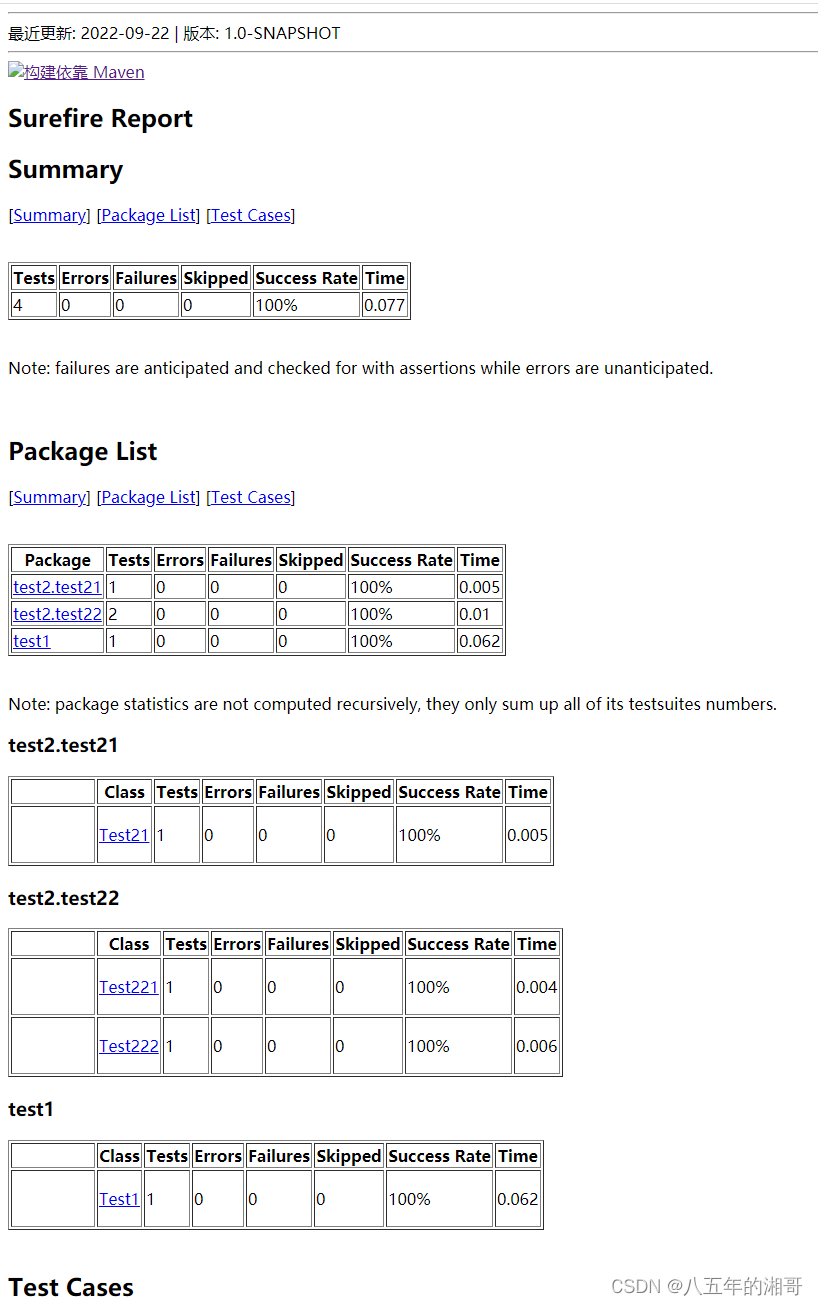热门标签
热门文章
- 1【面试经】数据分析 or 数据开发面试必备思路,面试官都会这样问。_数据开发岗位面试
- 2零基础转行Linux云计算运维工程师获得20万年薪的超级学习技巧_linux云计算运维工程师培训教程
- 3AI视频教程下载:使用ChatGPT进行市场营销
- 416行python画朵玫瑰_python画很多束玫瑰
- 5电销机器人电话机器人系统部署freeswich安装
- 6为什么很多企业会需要IT人才外包?_计算机为什么会产生外包人员这个形式
- 7FPGA block RAM和distributed RAM区别(以及xilinx 7系列CLB资源)
- 8elasticsearch查询操作(语句方式)_es模糊查询语句_elasticsearch 模糊查询
- 9Window安装并配置Mysql_windows mysql 配置文件
- 10python——飞机大战游戏(下载模块,知识点,图片)_python 飞机大战
当前位置: article > 正文
maven-surefire-plugin 单元测试套件_argline标签
作者:羊村懒王 | 2024-05-23 07:22:19
赞
踩
argline标签
maven-surefire-plugin 单元测试套件
前言
众所周知,Junit可用于单元测试,maven编译的时候也可以整体执行测试用例,但是很多时候测试用例过多,并且我们不希望老是重复执行已经验证过没有问题的用例而耗费时间,这个时候就要用到测试集了,也就是说通过配置的形式有针对性的对需要测试的用例进行检查!
Junit本身提供了测试套件,但是这个测试集不能生成测试报告,大家可以有选择性的参考下:
https://www.w3cschool.cn/junit/36em1hv1.html
我们今天介绍的是apache maven提供的一个集测试套件和测试报告的插件:maven-surefire-plugin
使用
依赖坐标
<?xml version="1.0" encoding="UTF-8"?> <project xmlns="http://maven.apache.org/POM/4.0.0" xmlns:xsi="http://www.w3.org/2001/XMLSchema-instance" xsi:schemaLocation="http://maven.apache.org/POM/4.0.0 http://maven.apache.org/xsd/maven-4.0.0.xsd"> <modelVersion>4.0.0</modelVersion> <groupId>org.example</groupId> <artifactId>test</artifactId> <version>1.0-SNAPSHOT</version> <properties> <maven.compiler.source>17</maven.compiler.source> <maven.compiler.target>17</maven.compiler.target> </properties> <dependencies> <dependency> <groupId>org.junit.jupiter</groupId> <artifactId>junit-jupiter-api</artifactId> <version>5.8.2</version> <scope>test</scope> </dependency> </dependencies> <build> <plugins> <plugin> <artifactId>maven-surefire-plugin</artifactId> <version>3.0.0-M5</version> <configuration> <includesFile> surefire-setting.xml </includesFile> <!--JDK8及以下不需要配置如下JVM参数--> <argLine> --add-opens java.base/java.lang=ALL-UNNAMED --add-opens java.base/java.math=ALL-UNNAMED --add-opens java.base/java.util=ALL-UNNAMED --add-opens java.base/java.util.concurrent=ALL-UNNAMED --add-opens java.base/java.net=ALL-UNNAMED --add-opens java.base/java.text=ALL-UNNAMED </argLine> </configuration> </plugin> </plugins> </build> </project>
- 1
- 2
- 3
- 4
- 5
- 6
- 7
- 8
- 9
- 10
- 11
- 12
- 13
- 14
- 15
- 16
- 17
- 18
- 19
- 20
- 21
- 22
- 23
- 24
- 25
- 26
- 27
- 28
- 29
- 30
- 31
- 32
- 33
- 34
- 35
- 36
- 37
- 38
- 39
- 40
- 41
- 42
- 43
- 44
- 45
- 46
- 47
- 48
测试用例
跟普通的Junit测试用例唯一的区别就是@Test需要使用org.junit.jupiter.api.Test才能被插件扫描到
surefire-setting.xml测试集配置
项目根路径编写
<!--可以使用全路径类名,也可以使用表达式,**表示多层目录,*表示一层目录-->
<pre>
<code>
*/test21/*
**/Test22*.java
test1.Test1.java
</code>
</pre>
- 1
- 2
- 3
- 4
- 5
- 6
- 7
- 8
这个地方其实任何文件都可以(本人已测试),只要配置的测试集是一行一行的即可,但是看标签源码是如上格式,那就按规矩来!
执行脚本
项目根路径编写surefire.sh,当然,你在根目录下直接执行如下命令也可!
mvn clean surefire-report:report
- 1
执行脚本后,可以看到项目target目录下多了两个目录surefire-reports、site,打开site目录下的测试报告文件如下:

声明:本文内容由网友自发贡献,不代表【wpsshop博客】立场,版权归原作者所有,本站不承担相应法律责任。如您发现有侵权的内容,请联系我们。转载请注明出处:https://www.wpsshop.cn/w/羊村懒王/article/detail/611878
推荐阅读
相关标签




